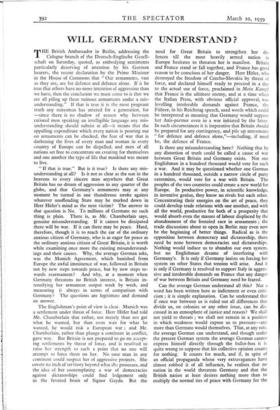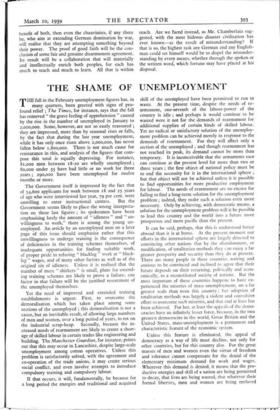WILL GERMANY UNDERSTAND?
THE British Ambassador in Berlin, addressing the Cologne branch of the Deutsch-Englische Gesell- schaft on Saturday, quoted, as embodying sentiments particularly deserving of attention by his German hearers, the recent declaration by the Prime Minister in the House of Commons that "Our armaments, vast as they are, are for defence and defence alone. If it be true that others have no more intention of aggression than we have, then the conclusion we must come to is that we are all piling up these ruinous armaments under a mis- understanding." If that is true it is the most pregnant truth any statesman has uttered for a generation, for —since there is no shadow of reason why between rational men speaking an intelligible language any mis- understanding should subsist at all—it means that the appalling expenditure which every nation is pouring out on armaments can be checked, the fear of war that is darkening the lives of every man and woman in every country of Europe can be dispelled, and men of all nations set free to concentrate on creating for themselves and one another the type of life that mankind was meant to live.
"If that is true." But is it true? Is there any mis- understanding at all? Is it not as clear as the sun in the heavens to every sincere man anywhere that Great Britain has no dream of aggression in any quarter of the globe, and that Germany's armaments may at any moment be turned in one thunderous stroke against whatever unoffending State may be marked down in Herr Hitler's mind as the next victim? The answer to that question is No. To millions of Germans no such thing is plain. There is, as Mr. Chamberlain says, genuine misunderstanding. If it cannot be dissipated there will be war. If it can there may be peace. Hard, therefore, though it is to reach the ear of the ordinary anxious citizen of Germany, who is as eager for peace as the ordinary anxious citizen of Great Britain, it is worth while examining once more the existing misunderstand- ings and their causes. Why, the average German asks, was the Munich Agreement, which banished from Europe the awful imminence of war, followed in Britain not by new steps towards peace, but by new steps to- wards rearmament? And why, at a moment when Germany threatens no British interest, is Britain in- tensifying her armament output week by week, and measuring it always in terms of comparison with Germany? The questions are legitimate and demand an answer.
The Englishman's point of view is clear. Munich was a settlement under threat of force. Herr Hitler had told Mr. Chamberlain that rather, not merely than not get what he wanted, but than even wait for what he wanted, he would risk a European war ; and Mr. Chamberlain, rather than plunge a continent in conflict, gave way. But Britain is not prepared to go on accept- ing settlements by threat of force, and is resolved to raise her strength to such a point that no one will attempt to force them on her. No sane man in any continent could suspect her of aggressive projects. She covets no inch of territory beyond what shr possesses, and the idea of her contemplating a war of democracies against dictatorships could find lodgement only in the fevered brain of Signor Gayda. But the need for Great Britain to strengthen her de- fences till the most heavily armed nation in Europe hesitates to threaten her is manifest. Britain and France stand or fall together, and France has good reason to be conscious of her danger. Herr Hitler, who destroyed the freedom of Czecho-Slovakia by threat of force, and declared himself ready to proceed in a day to the actual use of force, proclaimed in Mein Kampf that France is the ultimate enemy, and at a time when the Italian Press, with obvious official approval, was levelling intolerable demands against France, the Fiihrer, in his Reichstag speech, used words which could be interpreted as meaning that Germany would support her Axis-partner even in a war initiated by the latter. In such circumstances it is imperative that Britain should be prepared for any contingency, and pile up armaments "for defence and defence alone,"—including, if need be, the defence of France.
Is there any misunderstanding here? Nothing that by any distortion of truth could be called a cause of war between Great Britain and Germany exists. Not one Englishman in a hundred thousand would vote for such a war. And it may be questioned whether one German in a hundred thousand, outside a narrow circle of party extremists, would vote for a war with Britain. The peoples of the two countries could create a new world for Europe. In productive power, in scientific knowledge, in inventive genius, they know no rivals but each other. Concentrating their energies on the art of peace, they could develop trade relations with one another, and with all the world, productive for both of a prosperity that would absorb even the masses of labour displaced by the abandonment of the frenzied race in armaments ; the trade discussions about to open in Berlin may even now be the beginning of better things. Radical as is the opposition between democracy and dictatorship, there need be none between democracies and dictatorships. Nothing would induce us to abandon our own system, but no Englishman dreams of interfering with Germany's It is only if Germany insists on forcing her system on other States that tension will arise. And it is only if Germany is resolved to support Italy in aggres- sive and intolerable demands on France that any danger of war between Britain and Germany need be feared.
Can the average German understand all this? Not a word has been written here as indictment or even criti- cism ; it is simple explanation. Can he understand that if once war between us is ruled out all differences that divide us, on colonies or any other issue, can be dis- cussed in an atmosphere of justice and reason? We shall not yield to threats ; we shall not remain in a position in which weakness would expose us to pressure—any more than Germans would themselves. That, at any rate, the average German can understand, and though under the present German system the average German cannot express himself directly through the ballot-box it is quite wrong to suppose that his collective opinion counts for nothing. It counts for much, and if, in spite of an official propaganda whose very extravagances have almost robbed it of all influence, he realises that no nation in the world threatens Germany and that the British nation at least desires nothing more than to multiply the normal ties of peace with Germany for the benefit of both, then even the chauvinists, if any there be, who aim at extending German domination by war, will realise that they are attempting something beyond their power. The proof of good faith will be the con- clusion of some fair and genuine disarmament agreement. Its result will be a collaboration that will materially and intellectually enrich both peoples, for each has much to teach and much to learn. All that is within reach. Are we faced instead, as Mr. Chamberlain sug- gested, with the most hideous disaster civilisation has ever known—as the result of misunderstanding? If that is so, the highest task any German and any English- man could set himself would be to dispel the misunder- standing by every means, whether through the spoken or the written word, which fortune may have placed at his disposal.











































 Previous page
Previous page